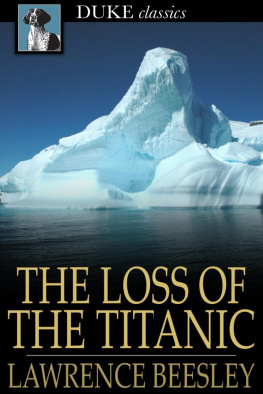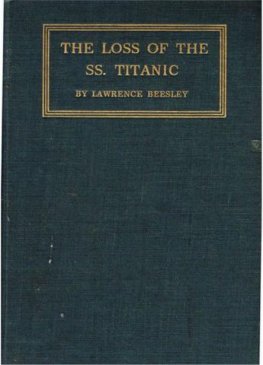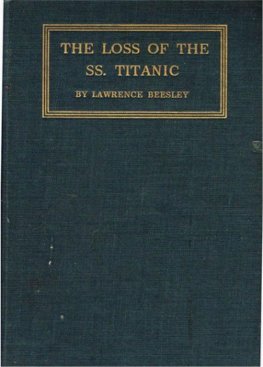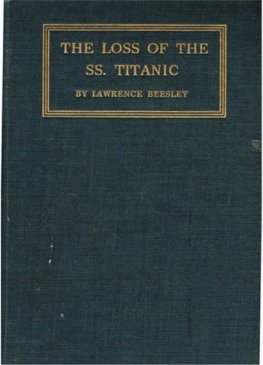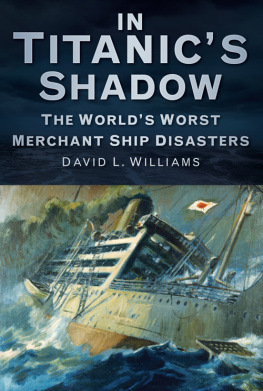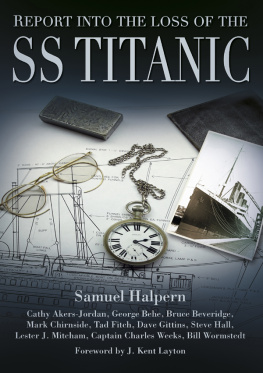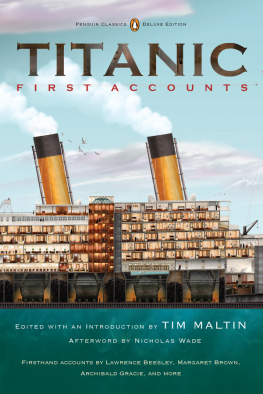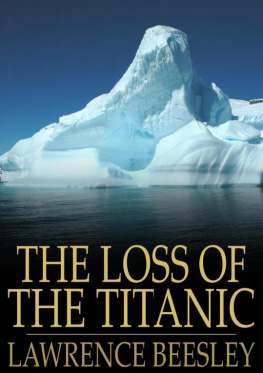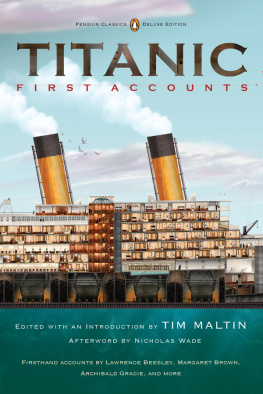Lawrence Beesley - The Loss of the Titanic
Here you can read online Lawrence Beesley - The Loss of the Titanic full text of the book (entire story) in english for free. Download pdf and epub, get meaning, cover and reviews about this ebook. year: 2009, publisher: The Floating Press, genre: Home and family. Description of the work, (preface) as well as reviews are available. Best literature library LitArk.com created for fans of good reading and offers a wide selection of genres:
Romance novel
Science fiction
Adventure
Detective
Science
History
Home and family
Prose
Art
Politics
Computer
Non-fiction
Religion
Business
Children
Humor
Choose a favorite category and find really read worthwhile books. Enjoy immersion in the world of imagination, feel the emotions of the characters or learn something new for yourself, make an fascinating discovery.
- Book:The Loss of the Titanic
- Author:
- Publisher:The Floating Press
- Genre:
- Year:2009
- Rating:5 / 5
- Favourites:Add to favourites
- Your mark:
- 100
- 1
- 2
- 3
- 4
- 5
The Loss of the Titanic: summary, description and annotation
We offer to read an annotation, description, summary or preface (depends on what the author of the book "The Loss of the Titanic" wrote himself). If you haven't found the necessary information about the book — write in the comments, we will try to find it.
The Loss of the Titanic — read online for free the complete book (whole text) full work
Below is the text of the book, divided by pages. System saving the place of the last page read, allows you to conveniently read the book "The Loss of the Titanic" online for free, without having to search again every time where you left off. Put a bookmark, and you can go to the page where you finished reading at any time.
Font size:
Interval:
Bookmark:
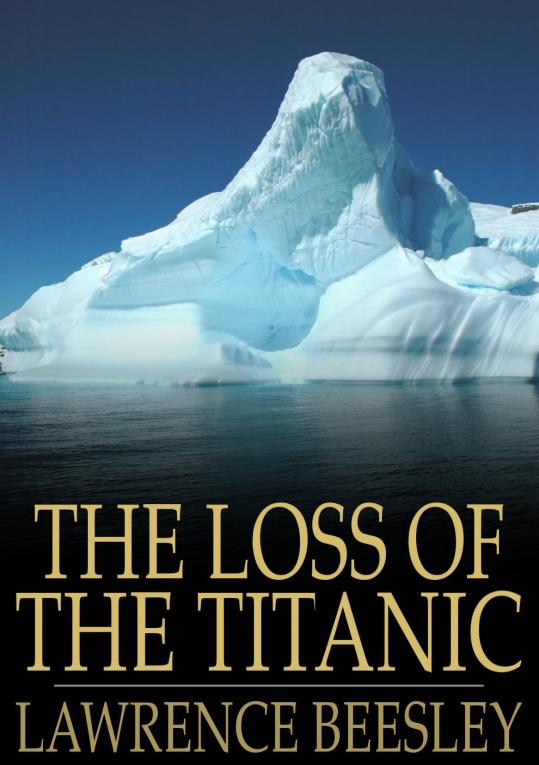

The Loss of the Titanic
Written by One of the Survivors
First published in 1912.
ISBN 978-1-775416-82-1
2009 THE FLOATING PRESS.
While every effort has been used to ensure the accuracy and reliability of the information contained in The Floating Press edition of this book, The Floating Press does not assume liability or responsibility for any errors or omissions in this book. The Floating Press does not accept responsibility for loss suffered as a result of reliance upon the accuracy or currency of information contained in this book. Do not use while operating a motor vehicle or heavy equipment. Many suitcases look alike.
Visit www.thefloatingpress.com
The circumstances in which this book came to be written are asfollows. Some five weeks after the survivors from the Titanic landedin New York, I was the guest at luncheon of Hon. Samuel J. Elder andHon. Charles T. Gallagher, both well-known lawyers in Boston. Afterluncheon I was asked to relate to those present the experiences of thesurvivors in leaving the Titanic and reaching the Carpathia.
When I had done so, Mr. Robert Lincoln O'Brien, the editor of theBoston Herald, urged me as a matter of public interest to writea correct history of the Titanic disaster, his reason being that heknew several publications were in preparation by people who had notbeen present at the disaster, but from newspaper accounts were piecingtogether a description of it. He said that these publications wouldprobably be erroneous, full of highly coloured details, and generallycalculated to disturb public thought on the matter. He was supportedin his request by all present, and under this general pressure Iaccompanied him to Messrs. Houghton Mifflin Company, where wediscussed the question of publication.
Messrs. Houghton Mifflin Company took at that time exactly the sameview that I did, that it was probably not advisable to put on recordthe incidents connected with the Titanic's sinking: it seemed betterto forget details as rapidly as possible.
However, we decided to take a few days to think about it. At our nextmeeting we found ourselves in agreement again,but this time on thecommon ground that it would probably be a wise thing to write ahistory of the Titanic disaster as correctly as possible. I wassupported in this decision by the fact that a short account, which Iwrote at intervals on board the Carpathia, in the hope that it wouldcalm public opinion by stating the truth of what happened as nearly asI could recollect it, appeared in all the American, English, andColonial papers and had exactly the effect it was intended to have.This encourages me to hope that the effect of this work will be thesame.
Another matter aided me in coming to a decision,the duty that we, assurvivors of the disaster, owe to those who went down with the ship,to see that the reforms so urgently needed are not allowed to beforgotten.
Whoever reads the account of the cries that came to us afloat on thesea from those sinking in the ice-cold water must remember that theywere addressed to him just as much as to those who heard them, andthat the duty, of seeing that reforms are carried out devolves onevery one who knows that such cries were heard in utter helplessnessthe night the Titanic sank.
The history of the R.M.S. Titanic, of the White Star Line, is one ofthe most tragically short it is possible to conceive. The world hadwaited expectantly for its launching and again for its sailing; hadread accounts of its tremendous size and its unexampled completenessand luxury; had felt it a matter of the greatest satisfaction thatsuch a comfortable, and above all such a safe boat had been designedand builtthe "unsinkable lifeboat";and then in a moment to hearthat it had gone to the bottom as if it had been the veriest trampsteamer of a few hundred tons; and with it fifteen hundred passengers,some of them known the world over! The improbability of such a thingever happening was what staggered humanity.
If its history had to be written in a single paragraph it would besomewhat as follows:
"The R.M.S. Titanic was built by Messrs. Harland & Wolff at theirwell-known ship-building works at Queen's Island, Belfast, side byside with her sister ship the Olympic. The twin vessels marked such anincrease in size that specially laid-out joiner and boiler shops wereprepared to aid in their construction, and the space usually taken upby three building slips was given up to them. The keel of the Titanicwas laid on March 31, 1909, and she was launched on May 31, 1911; shepassed her trials before the Board of Trade officials on March 31,1912, at Belfast, arrived at Southampton on April 4, and sailed thefollowing Wednesday, April 10, with 2208 passengers and crew, on hermaiden voyage to New York. She called at Cherbourg the same day,Queenstown Thursday, and left for New York in the afternoon, expectingto arrive the following Wednesday morning. But the voyage was nevercompleted. She collided with an iceberg on Sunday at 11.45 P.M. inLat. 41 46' N. and Long. 50 14' W., and sank two hours and a halflater; 815 of her passengers and 688 of her crew were drowned and 705rescued by the Carpathia."
Such is the record of the Titanic, the largest ship the world had everseenshe was three inches longer than the Olympic and one thousandtons more in gross tonnageand her end was the greatest maritimedisaster known. The whole civilized world was stirred to its depthswhen the full extent of loss of life was learned, and it has not yetrecovered from the shock. And that is without doubt a good thing. Itshould not recover from it until the possibility of such a disasteroccurring again has been utterly removed from human society, whetherby separate legislation in different countries or by internationalagreement. No living person should seek to dwell in thought for onemoment on such a disaster except in the endeavour to glean from itknowledge that will be of profit to the whole world in the future.When such knowledge is practically applied in the construction,equipment, and navigation of passenger steamersand not untilthenwill be the time to cease to think of the Titanic disaster andof the hundreds of men and women so needlessly sacrificed.
A few words on the ship's construction and equipment will be necessaryin order to make clear many points that arise in the course of thisbook.
The considerations that inspired the builders to design the Titanic onthe lines on which she was constructed were those of speed, weight ofdisplacement, passenger and cargo accommodation. High speed is veryexpensive, because the initial cost of the necessary powerfulmachinery is enormous, the running expenses entailed very heavy, andpassenger and cargo accommodation have to be fined down to make theresistance through the water as little as possible and to keep theweight down. An increase in size brings a builder at once intoconflict with the question of dock and harbour accommodation at theports she will touch: if her total displacement is very great whilethe lines are kept slender for speed, the draught limit may beexceeded. The Titanic, therefore, was built on broader lines than theocean racers, increasing the total displacement; but because of thebroader build, she was able to keep within the draught limit at eachport she visited. At the same time she was able to accommodate morepassengers and cargo, and thereby increase largely her earningcapacity. A comparison between the Mauretania and the Titanicillustrates the difference in these respects:
Font size:
Interval:
Bookmark:
Similar books «The Loss of the Titanic»
Look at similar books to The Loss of the Titanic. We have selected literature similar in name and meaning in the hope of providing readers with more options to find new, interesting, not yet read works.
Discussion, reviews of the book The Loss of the Titanic and just readers' own opinions. Leave your comments, write what you think about the work, its meaning or the main characters. Specify what exactly you liked and what you didn't like, and why you think so.


